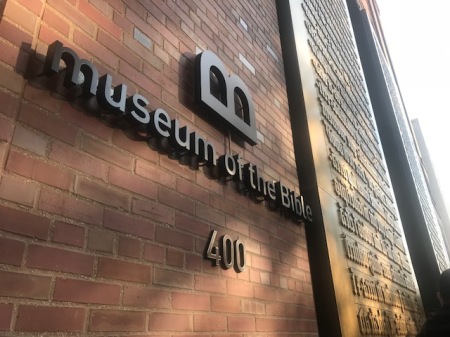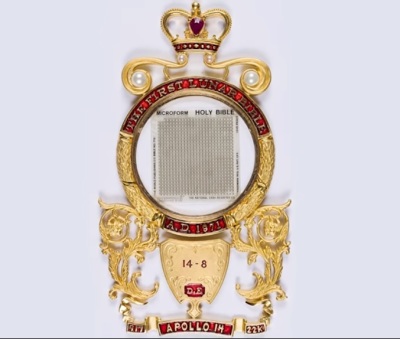Museum of the Bible replaces NASA 'Lunar Bible' after authenticity questioned by expert

The Museum of the Bible in Washington, D.C. recently replaced an artifact purporting to be a miniature Bible taken to the moon in 1971 after its authenticity was called into question by an expert.
The Associated Press reports that the museum — an endeavor largely funded by the Christian family that owns the craft store chain Hobby Lobby — removed from display a microfilm Bible thought to have been one of about 100 tiny bibles brought to space by Apollo 14 astronaut Edgard Mitchell.
The “Lunar Bible” — measuring in at 1.5 inches by 1.5 inches — can be read-only with a microscope and is considered by some collectors to be “one of the rarest books in the world,” according to the museum. The Apollo Prayer League adopted the use of microform technology because of NASA weight restrictions.

The Bible was reportedly purchased by museum chairman Steve Green for the Green family’s collection in 2012 for about $56,000 at auction. Other Apollo microform bibles have sold at auctions in the past. In 2014, one sold at an auction in Texas for $75,000.
According to AP, the microform Bible owned by Green was also previously on display at the Vatican in Rome.
The piece had been on display at the Museum of the Bible until Oklahoma-based author Carol Mersch doubted the authenticity of the piece because of a glaring discrepancy in the item’s serial number.
Mersch had written a book on the Apollo Prayer League and herself had been given 10 lunar bibles by former NASA chaplain and Apollo Prayer League co-founder John Stout.
Mersch told AP that she questioned the authenticity of the artifact on display at the museum because its serial number was only three digits instead of five digits like the other bibles engraved by Stout.
Mersch generously provided the museum with one of the lunar bibles that had been given to her and authenticated by Stout.
“I thought [a donation was] the best thing I could do to honor Rev. Stout,” Mersch told AP. “He had asked me to donate them to museums.”
Museum spokesperson Heather Cirmo assured the news agency that the institution knows “for sure” that the Lunar Bible in display now actually went to the moon.
“[W]e could not verify for sure that the one we had originally on display had gone to the moon,” Cirmo was quoted as saying. “We couldn’t disprove it, it just wasn’t certain.”
Cirmo defended the museum’s decision to change out the bibles without making a public announcement or statement.
“It’s pretty ridiculous to think that any museum, that every time you switch something out you’re going to announce it on plaques,” Cirmo stressed. “Collectors make mistakes all the time. ... This is not something that is unique to Steve Green.”
This is not the first time that the authenticity of a Museum of the Bible artifact has been called into question.
The museum announced last year that an independent research investigation found that five of its 16 Dead Sea Scroll fragments on display since the museum’s opening in November 2017 were likely not authentic.
Before the museum’s opening, Hobby Lobby was fined $3 million and was forced to return about $1.6 million in Iraqi archaeological artifacts after authorities determined that the artifacts were stolen and smuggled into the U.S.
Follow Samuel Smith on Twitter: @IamSamSmith
or Facebook: SamuelSmithCP





















